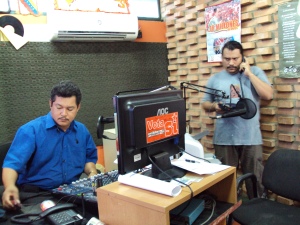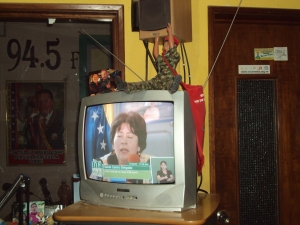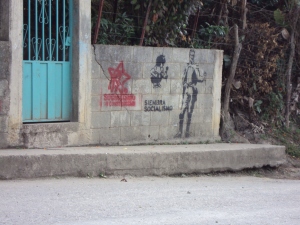The Comuna and the state
Below is an article I wrote while working for School of the Americas Watch and doing field work for my thesis in Barquisimeto, Venezuela. There are many typos and misspellings. I had been in Venezuela for many months living in the heart of dynamic political change, witnessed a coup in Honduras through the lens of socialist leaning Venezuela and participated in several community media projects which took these issues to the local level through community based programming. The article below reflects the winds of change, urgency, contradiction, and vision I experienced there.
June 28, 2009
 In the Carucenia neighborhood of Barquisimeto, Venezuela, a community center known as the CPC (Centro Popular Communitario) came under attack by the local Barquisimeto government because of the community-based power that the center came to have and represent in the recent years. The government residing over the state of Lara, which Barquisimeto is the capital of, was described to me as pro-Chavez by name but politically centrist by action. The tensions between this local government and the collective bodies of popular power at the base is one of many examples of the different interests that come head to head within what many descibe as “the process” of transformation happening in Venezuela. Often, where folks at the base are pushing the revolution forward on their own terms, local governments follow a self-interested trajectory and timeline. These different visions of the revolutionary future have been drawn out even more with the recent emergence of the Comuna, a geographically configured federation that pulls the consejo comunales (local neighborhood associations that collectively plan projects to meet community based needs with government financial support) together to build power from bottom up. Each comuna has a “mesa tecnica” which is a sort of board that consists of bolseros (community spokespeople) who are re-elected every two years and address community needs in terms of health, education, urban and rural land issues, culture and sports and communication of the comuna.
In the Carucenia neighborhood of Barquisimeto, Venezuela, a community center known as the CPC (Centro Popular Communitario) came under attack by the local Barquisimeto government because of the community-based power that the center came to have and represent in the recent years. The government residing over the state of Lara, which Barquisimeto is the capital of, was described to me as pro-Chavez by name but politically centrist by action. The tensions between this local government and the collective bodies of popular power at the base is one of many examples of the different interests that come head to head within what many descibe as “the process” of transformation happening in Venezuela. Often, where folks at the base are pushing the revolution forward on their own terms, local governments follow a self-interested trajectory and timeline. These different visions of the revolutionary future have been drawn out even more with the recent emergence of the Comuna, a geographically configured federation that pulls the consejo comunales (local neighborhood associations that collectively plan projects to meet community based needs with government financial support) together to build power from bottom up. Each comuna has a “mesa tecnica” which is a sort of board that consists of bolseros (community spokespeople) who are re-elected every two years and address community needs in terms of health, education, urban and rural land issues, culture and sports and communication of the comuna.The vision of the Comuna for me was drawn out during a conversation I had with one community activist and organizer who highlighted how tensions between the local government and the creation of the Comuna resulted in the attempted seizure of the CPC which has served as the most central location from where one important Comuna organizes itself. When I asked him why the government was so afraid of the power of the Comuna, we discussed the idea that eventually the Comunas may eliminate the need for local government because the Comuna is in touch with its own needs will be able to provide its own government. In line with that train of thought I asked him what the future of the centralized state would be in Venezuela if the Comuna become the center-piece for the emerging socialism here. He responded that Chavez had already made his own death in a recent airing of Alo Presidente where the president spoke about the future of the Comuna as the most important center of power and the need for the people to move the revolution forward with or without him.
However, the complex role of local government within Venezuela’s emerging socialism was illuminated by an activist with the youth contingent of the PSUV (Partido Socialista Unida de Venezuela) who highlighted that local mayors and governors hold an important role because Venezuela is very much still capitalist. With the increase of the minimum wage, which is now the highest in Latin America consumerism is on the rise and the need to conduct national projects and bring unity among the different revolutionary forces is still a major concern. Where an internal opposition sponsored by funds from the National Endowment for Democracy (a US based foreign aid organization that funds counter-revolutionary projects), is supported by an external opposition taking form in the neo-liberal projects of the United States, the local government is still needed. To counter the growing consumer mentality, the PSUV has launched a campaign to create an ideological school to raise the level of conciousness among the base.
Attending the PSUV ideological schools planning meeting provided a small window into the organizing structure of the PSUV and what their vision of protagonistic participatory democracy looked like. The group met in the local mayors office with some 50 elected spokes people from various sectors of the PSUV and were broken into 6 different groups who created their own proposed themes for the school. The meeting ended with a summary of each groups themes and a motion to meet the following week consolidate all the ideas into one proposal to submit along with all the other PSUV chapters.
With the formation of new ideological apparatuses through the party and the development of collective governing structures at the base through the Comunas the challenge to traditional forms of capitalism and consumerism are increased, however, the tensions between these different bodies of power is highlighted when the peoples collective needs do not mesh with the visions of a party or government. New forms of socialism are advancing from below at a faster rate than the electorally based socialism advancing from above.
This advancement has been facilitated by the community participants at the CPC as it has become a major power center for the base because it not only offers free art, music, dance, theater and computer classes, a free dentistry clinic, a community radio and TV station, but also operates as a free space for community based events and organizing especially around the formation of the Comuna. Through the creation of the center and the emerging Comuna, the community has begun to develop their own governing structures and as a result the local government has sponsored and supported the seizure of the space.
During a recent visit to the space I found masses of people who decided to squat in the buildings of the small CPC community while some members ran errands to change locks on the doors to secure the area. Radio Cepescuela, a community radio housed out of the CPC became a major vehicle to get information out about what was happening at the center and as a result of the radio, the participation in holding down the space increased. In interviews I conducted with community radio producers at Radio Cepescuela, folks highlighted the force of the radio in the organizing of the community to fight against the government invasion of the space. The radio for the community of the CPC has become so central to community organizing and identity where community members both create and listen to the shows aired through the station.
Because Radio Cepescuela is part of the ANMCLA (an alternative media network that brings community media under one umbrella and acts as a mobilizing front both against corporate and commercial media under one umbrella as well as toward the building of a revolutionary process that foregrounds collective community voices), the situation at the CPC has been publicized to the wider Venezuelan public as well as some international activists including an Argentinian community radio station who when I was at the radio sent via email a letter of solidarity that was read on air to Barquisimeto listeners. The radio at the CPC can be seen as pushing forward the idea of the Comuna by providing a space for diverse collective representations that are unified through the on air programs. These forms kinds of political projects in Venezuela actually began to emerge far before the Chavez government. Radio Cepescuela for example originated in the 1990s as a clandestine station. Under the Chavez government organizing that contested the state still contests the state, only now the state listens more so than not.

This listening to the base became a national project when government sponsored challenges to elite forms of political participation resulted in the rewriting of the constitution in 1999. Historically marginalized groups were supported by Title 5 which called for the participatory protagonism and sovereignty of the people leading to the right for communities to decide their own futures and govern themselves. In 2006 this article manifested in the creation of the Consejo Comunales which have diversified the ways the proposed socialism of Venezuela gets negotiated at the local level and has also raised the level of participation in both local and national politics. Because of different challenges faced by the consejo comunales in terms of either getting enough government funding, effectively using that funding and organizing in the community, the Comuna, according to one community activist grew out of community reflections on the successes and challenges faced by the consejo comunales.
Time and time again, the vision of a unified front on the side of Chavez is undercut by more diverse and nuanced forces that come into tension around the idea of advancing toward socialism. It will certainly be interesting to watch how the Comunas progress from below and whether or not the state and local governments side with the interests of these collective bodies as it was according to the PSUV student activist I interviewed incredibly important to maintain government structures that operate from above to facilitate “the process” and unify the nation in spite of continued opposition from inside and outside. Today of all days that opposition became apparent not in Venezuela, but in Honduras where there was just a coup against President Manuel Zelaya who recently proposed a constitutional referendum to increase the democratic potential of Honduras. Sponsored by the oligarchy, military and the United States Zelaya was kidnapped and taken to Costa Rica where he is now being held captive. As I am writing, Chavez is saying on Telesur (the Latin American news bloc) that an assault against Honduras is an assault against Venezuela and the democracy being proposed by the people at the base. This situation makes me re-think the need for nationalism and government when there are international forces that aim to de-center advances toward people driven democracies.

LE-MERIDIAN FINANCING SERVICES. the loan company that grant me loan of 5,000,000.00 USD When other loan investors has neglect my offer but Le_Meridian Funding Service grant me success loan.they are into directly in loan financing and project in terms of investment. they provide financing solutions to companies and individuals seeking access to capital markets funds, they can helped you fund your project or expand your business.. Email Contact:::: lfdsloans@lemeridianfds.com Also lfdsloans@outlook.com or Write on whatsapp Number on 1-(989-394-3740)Good Intend,
ReplyDelete